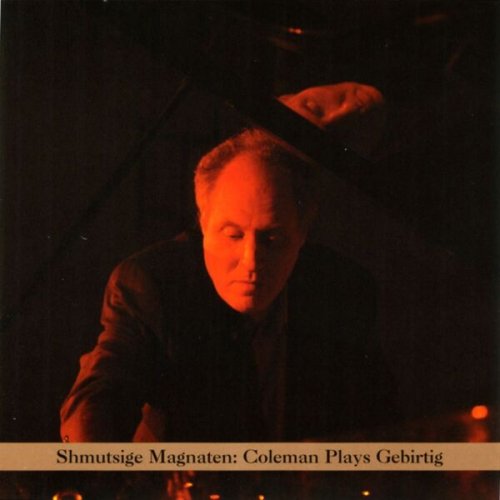
Anthony Coleman - Shmutsige Magnaten: Coleman Plays Gebirtig (2006)
BAND/ARTIST: Anthony Coleman
- Title: Shmutsige Magnaten: Coleman Plays Gebirtig
- Year Of Release: 2006
- Label: Tzadik
- Genre: Jazz, Contemporary Jazz
- Quality: FLAC (tracks)
- Total Time: 1:01:31
- Total Size: 291 MB
- WebSite: Album Preview
Tracklist:
1. Hidden Language (03:37)
2. BIm (04:29)
3. Eurotrash Ballade (05:34)
4. You Don't Know What Love Is (05:02)
5. The Dream Factory (11:01)
6. The Mooche (04:34)
7. Bom (06:30)
8. Goodbye And Good Luck (13:01)
1. Hidden Language (03:37)
2. BIm (04:29)
3. Eurotrash Ballade (05:34)
4. You Don't Know What Love Is (05:02)
5. The Dream Factory (11:01)
6. The Mooche (04:34)
7. Bom (06:30)
8. Goodbye And Good Luck (13:01)
Anthony Coleman has been a wild man on the downtown New York scene for many years. His previous recordings for Tzadik have all been released as part of the Radical Jewish Culture series, all of which have been band recordings. Shmutsige Magnaten is a solo piano and vocal recording of the compositions of Mordechai Geburtig, a folk composer of Yiddish song who lived in and around Krakow, Poland, in a neighborhood called Kazimierz; he died during the Holocaust. Coleman states in his notes that one should equate Geburtig with folk composers such as Woody Guthrie and Leadbelly. Coleman has been under the sway of the composer since 2003 when he was playing a gig in Krakow and performed a version of "S'brent [My Town Is Burning]." This set was recorded in a synagogue, at midnight, in Krakow, in the Kazmierz neighborhood as part of the Jewish Culture Festival. There is a great delight in Coleman's arrangements for solo piano -- these pieces were indeterminate, they had different settings for whoever played and sang them, and he goes to great lengths to explain that his arrangements don't get at the songs themselves so much since they were meant to be sung. This frees up Coleman, as is evidenced by his reading of "Kartofl Zup mit Shvamen [Potato Soup with Mushrooms]," where he extrapolates the original melody and inserts both blues and post-bop jazz, layering them on top, without ever losing the original's intent. The piece actually swings. It also serves on "Minuten Fun Betochen/Minuten Fun Yiesh [Moments of Confidence/Moments of Despair]," on in which he uses the original tune, playing it through with subtle mischief and gracious intent (not to mention a keen ear for musical irony and counterpoint), and then slips inside its harmonies a new melody of his own creation -- he takes co-writing credit for this one as is only fitting since he grafted an entirely new composition onto it and made something wholly new. His reading of "S'brent" here is a very different animal than his first performance -- according to him -- it is subtly shaded and carries within it a dynamic tension that is breathtaking. The music here has delight, great sadness, optimism, grief, pain, and a sense of history that seems have been bled out of most folk music in the latter half of the 20th century. This is a music of heritage interpreted for a new generation, a new century, a new set of problems both social and political, that are oddly reflected, mirror-image style, as being different sides of the same coin. Coleman is a master, and if you're at all interested either in Yiddish music or solo piano recordings that transcend jazz, blues, and other folk forms, let Shmutsige Magnaten be it. © Thom Jurek
As a ISRA.CLOUD's PREMIUM member you will have the following benefits:
- Unlimited high speed downloads
- Download directly without waiting time
- Unlimited parallel downloads
- Support for download accelerators
- No advertising
- Resume broken downloads


